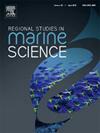Data-driven optimization of coastal sea level monitoring: Leveraging known patterns for enhanced reconstruction
IF 2.1
4区 环境科学与生态学
Q3 ECOLOGY
引用次数: 0
Abstract
Efficiently configuring sea level monitoring stations is crucial for obtaining accurate spatiotemporal data while managing operational and maintenance costs and addressing the challenges posed by missing data. This study focuses on optimizing the selection of stations within Turkey's coastal sea level monitoring network by leveraging the inherent lower dimensionality in data. The network consists of 18 stations distributed along Turkey's coastline. To identify dominant patterns in historical sea level data, Empirical Orthogonal Function (EOF) analysis was employed, followed by the application of the QR decomposition with column pivoting algorithm. Model performance is assessed using the Nash-Sutcliffe coefficient of efficiency (CE) and root mean square error (RMSE). Remarkably, the results demonstrated that reconstructing the entire dataset, encompassing all 18 stations was possible with a CE of 0.94 and an RMSE of 0.06. Even utilizing data from two or three stations alone achieves acceptable reconstruction accuracy. The effectiveness of EOF analysis combined with QR with column pivoting algorithm suggests promising applications in various scientific fields.
数据驱动的沿海海平面监测优化:利用已知模式加强重建
有效配置海平面监测站点对于获取准确的时空数据、管理运行和维护成本以及应对数据缺失带来的挑战至关重要。本研究的重点是利用数据固有的低维度特性,优化土耳其沿海海平面监测网络中站点的选择。该网络由分布在土耳其海岸线上的 18 个站点组成。为识别历史海平面数据中的主要模式,采用了经验正交函数(EOF)分析,然后应用 QR 分解和列透视算法。使用纳什-苏特克利夫效率系数(CE)和均方根误差(RMSE)评估模型性能。结果表明,重建包括所有 18 个站点在内的整个数据集的效率系数为 0.94,均方根误差为 0.06。即使仅利用两三个站点的数据也能达到可接受的重建精度。EOF 分析与 QR 以及柱枢轴算法相结合的有效性表明,在各个科学领域的应用前景广阔。
本文章由计算机程序翻译,如有差异,请以英文原文为准。
求助全文
约1分钟内获得全文
求助全文
来源期刊

Regional Studies in Marine Science
Agricultural and Biological Sciences-Ecology, Evolution, Behavior and Systematics
CiteScore
3.90
自引率
4.80%
发文量
336
审稿时长
69 days
期刊介绍:
REGIONAL STUDIES IN MARINE SCIENCE will publish scientifically sound papers on regional aspects of maritime and marine resources in estuaries, coastal zones, continental shelf, the seas and oceans.
 求助内容:
求助内容: 应助结果提醒方式:
应助结果提醒方式:


